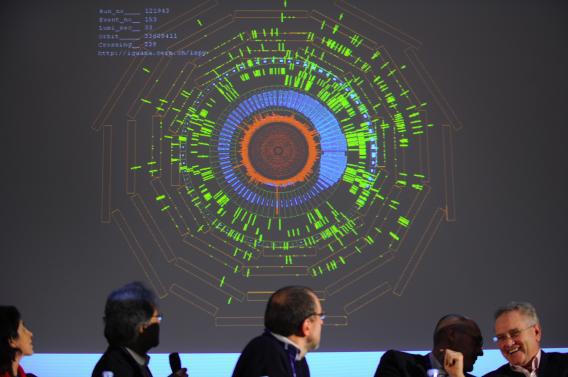Tomorrow, even Americans who don’t wear red, white, and blue on a day-to-day basis will celebrate their country with fireworks, hot dogs, and perhaps the occasional ruptured stomach.
But it will probably be a rough day for one group of Americans: physicists who have been engaged in a decades-long race with European-led scientists to discover the Higgs boson. (For a comprehensive explanation about what the Higgs is and why it’s important, read this rundown from Sean Carroll on Discover. Also check out the New Scientist’s Higgs timeline.)
The United States and Europe have a rich history of racing to identify subatomic particles. Back in June 1983, a New York Times editorial (subscription required) complained, “Europeans have taken the lead in the race to discover the ultimate building blocks of matter.” At the time, CERN had just announced the discovery of the Z-zero subatomic particle—the third of three “intermediate vector bosons” uncovered by European scientists. These were sort of precursors to the hunt for the Higgs boson. The Times went on to cast the frontier of physics research as another international sporting event: “The 3-0 loss in the boson race cries out for earnest revenge. The physics team needs to try harder, and coach Keyworth [President Ronald Reagan’s science adviser George Keyworth] should reward any sensible new strategy with management’s full support.”
CERN’s first attempt at finding the Higgs relied on an apparatus called the Large Electron-Positron collider, which saw hints of the Higgs before being retired, despite some physicists’ protest, in 2000. Without the LEP, it looked like America might be the one to find the Higgs boson. In an ABC News piece from September 2000, Alexander Higgins wrote:
Scientists who think they have come tantalizingly close to discovering a long-sought subatomic particle have decided to press ahead for another month rather than immediately leave the field—and a probable Nobel prize—to their main American rival.
When CERN, the European Laboratory for Particle Physics, halts experiments on the Large Electron-Positron collider, it will have to sit and watch for five years as the Fermi National Accelerator Laboratory in Batavia, Ill., has free rein to discover the so-called Higgs boson.
But the United States’ Fermilab did not discover the Higgs when it had the field to itself, and when CERN opened its Large Hadron Collider for business in 2008, the race was on again. However, the next year, the Large Hadron Collider was taken out of commission for repairs, and U.S.-based scientists claimed that they were in the lead. The BBC reported:
Europe’s particle physics lab, Cern, is losing ground rapidly in the race to discover the elusive Higgs boson, or “God particle”, its US rival claims. …
[T]he US Fermilab says the odds of its Tevatron accelerator detecting the famed particle first are now 50-50 at worst, and up to 96% at best.
And indeed, in 2010, there were reports that the United States was about to announce the discovery of the Higgs. Now, though, it appears that the Europeans will win—even if, as Wired points out, work at Fermilab and elsewhere in the United States has contributed in a big way to tomorrow’s presumed announcement.
Was CERN deliberately trying to taunt the American team by scheduling the announcement for the Fourth of July? Probably not—the date was selected to immediately precede the International Conference on High Energy Physics, which begins July 4 in Melbourne. But the coincidence must surely be a twist of the knife in the egos of America’s physicists.
